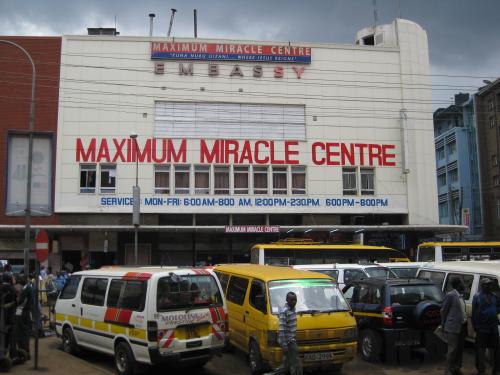|
 |
|
LUCRATIVE:A proliferation of "miracle centers" have sprung up in Africa |
In Kenya, the Registrar of Societies shows that there are over 4,000 church denominations, most of which sprung up just five years ago. On the African continent, the number is in the millions.
Churches are generally considered to be non-profit making organizations and they are therefore not taxed. But by promoting the message of hope from poverty (many poor Africans believe the devil is the cause), they now run like corporations with their pastors as CEOs.
But in a world where CEOs of top multinationals are not so popular because of the salaries they earn, why is it that no one has raised a finger against this trend? Opinion is varied.
"It is not illegal," observes Charles Mokaya, a Kenyan sociologist. "These people are convinced that the more they give, the more they will get in return."
In his Master's thesis, Mokaya had earlier noted, "Since the poor would always want to get rich, anything that brings hope lures them to give money, as long as they are promised to get returns."
And in countries with freedom of worship, "it is difficult to stop this trend and governments just leave it to individuals to decide," he says.
Zablon Nthamburi, a lecturer of religious studies at the Kenya Methodist University, says the Bible does not allow people to do business in the church. He says however that the Church has become more of a business enterprise.
"The church must abandon these ills and walk in the highway of holiness," says David Owuor who preaches for the Repentance and Holiness Ministry, a church without any specific place of worship.
"It is wrong to ask people to contribute money before being prayed for and when you know the people will not even be healed." This observation has caused friction with other pastors.
"I know there are some who say they can't take money. How can you preach without money? The gospel does not run on water and I am not going to live in that denial," says Apostle Thomas Wahome of the Helicopter of Christ Ministries.
However, Apostle Wahome is currently at the center of a court case. A woman recently claimed he deserted her with children after marriage and she is demanding $5,000 for the children's upkeep because "he is a rich man."
(Reporting from Kenya)
Pros & cons
> Whether these are true interpretations of the bible is up for debate. But there are worshippers who say they give willingly.
"I gave because I wanted a husband. The pastor told us we would be blessed if we sow the seed," explains Janeth Karani. Karani is a jobseeker who also wants to marry. She says these can only be given to a person if you serve God right. To her, paying for prayers is a non-issue.
But Josephat Opiyo is a wounded man. He said he has been forced to sell many of his possessions to keep pace with the demands of the church. "I have been forced to sell my mobile phone, clothes and even borrow money from friends because the pastor insisted [that donating money] would make my problems go away."
"Now, I know that it doesn't help and I am quitting," he said. |